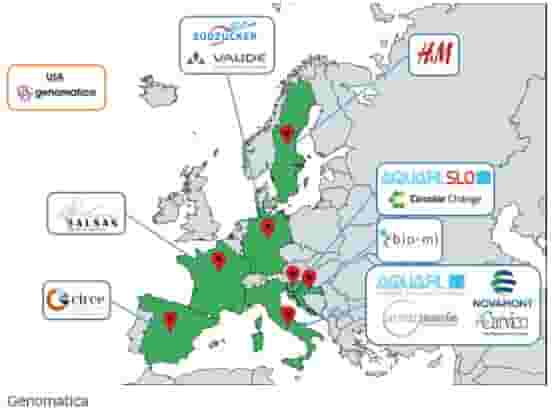Ambitious alliance mobilizes value chain for bio-based polymers – Ambitious alliance value chain biobased polymers - Arhive
Ambitious alliance mobilizes value chain for bio-based polymers Ambitious alliance value chain biobased polymers

It’s been a little over a hundred years since the first synthetic resin, Bakelite, was created from coal tar and wood alcohol. In the century that followed, countless variations have been developed and the proliferation of plastics, due to their incredible versatility and low cost, has been astronomical.
Many would say that that this proliferation has been the very antithesis of sustainability. Due to its low cost, the rise of plastics has encouraged waste. It litters our landscapes and our oceans, and its production utilizes massive quantities of fossil fuel. Every kilogram of plastic produced from oil emits 6 kg of carbon dioxide. And yet, it’s hard to imagine our modern world without it.
This raises the question: Is a sustainable value chain for plastics even possible?
Efforts at recycling are a good place to start. But going back the 1970s, only 9 percent of all plasticever produced has been captured. While efforts to collect and reuse these materials continue to expand, so does the use of plastics.
What will it take to really shake things up on this crucial issue? Project Effective, an integrated European stakeholder project, is being backed by at least a dozen companies that are seeking to change the formula. Its focus is to catalyze the development and proliferation of bio-based plastics that can be recycled over and over again.
The initiative emerged from a partnership between Aquafil, an Italian producer of nylon fibers used in carpeting and textiles, and Genomatica, a San Diego-based biotech company focused on the development of bio-based polymer materials. Both companies say they are heavily committed to sustainability.

“The basic idea is to completely decouple nylon from oil and to make the material from renewable resources, and then, with Econyl, to recycle it an infinite number of times,” Aquafil CEO Giulio Bonazzi told GreenBiz. “This would mean an incredible result in term of raw material accountancy for the planet.”
Nylon is an extensively used material. It can be found in carpeting and many textiles, including things like umbrellas, swimsuits, luggage, tires and, of course, stockings. Carpeting alone currently accounts for 2 percent of all landfill material, according to data from the Environmental Protection Agency, so there is plenty of “raw” material to draw on.
Aquafil’s Econyl process produces recycled nylon that requires no additional oil, and it requires as much as 50 percent less energy than the conventional process, according to the company. Global warming emissions are reduced as much as 80 percent compared with the standard process for making nylon, the company claims. It just opened its first recycling plant outside of Phoenix, which runs entirely on renewable energy.
Genomatica, meanwhile, has developed bio-based fibers that are being used in high-performance clothing (e.g. Spandex) and packaging. Its process substitutes bio-based versions of feedstocks such as 1,4-Butanediol (BDO) for their petroleum-based predecessors.
The two companies formed their partnership with the goal of creating a bio-based version of caprolactam, which is the molecule that forms the basis for nylon-6. The plan is for Genomatica to develop the biochemistry, while Aquafil will focus on the conventional processing aspects.
Genomatica CEO Christophe Schilling told GreenBiz that his company met up with Aquafil as the result of Genomatica’s involvement with Novamont, another Italian company, in the development of a biodegradable and compostable bioplastic that is now sold commercially under the name MATER-BI. Novamont will pursue a bio-based polyester as part of this project.
What became clear early on, given the development of cost-effective, bio-based versions of these common fibers, was that success in the marketplace will require the participation of numerous other players.Ambitious alliance value chain biobased polymers
“With the new technologies being developed came the possibility to totally rethink the value chain,” Schilling said. “…Maybe an interesting way to do that would be to form a broader consortium of stakeholders. Particularly in Europe, where the sustainability climate right now is much stronger than in the United States.”Thus, with the help of a grant from the European Union’s Horizon 2020 program, Aquafil and Genomatica catalyzed Project Effective, which now includes a dozen European companies. The participants include raw plastic producers (Aquafil and Novamont), a bio-based feedstock provider (Südzucker), a carpet manufacturer (Balsan), textile producers (Carvico, H&M, and Vaude), a plastic film manufacturer (Bio-Mi), a company specialized in energy efficiency (CIRCE), a life-cycle assessment specialist (Life Cycle Engineering) and a coordinator entitled for dissemination and exploitation of the project (Circular Change). Genomatica will provide biotechnology as an affiliated partner.Ambitious alliance value chain biobased polymers
Aquafil has already developed and implemented industrial-scale recycling capacity for nylon carpeting. If it can work with these partners to bring forth the ability to produce virgin nylon from renewable non-food materials, the industry could find itself one step closer to a sustainable ecosystem for producing a fully recyclable of this material much more cost-effectively. And that could lead to entirely new applications, the stakeholders believe.Ambitious alliance value chain biobased polymers
“Nylon can be applied to many different products,” Bonazzi said. “However, because it’s more expensive, it has been heavily substituted by polyester (in textile) and polypropylene (in injection molding). However, we believe that having a renewable and fully recyclable material, could make it attractive in these and other areas where it hasn’t been used before.”Ambitious alliance value chain biobased polymers
